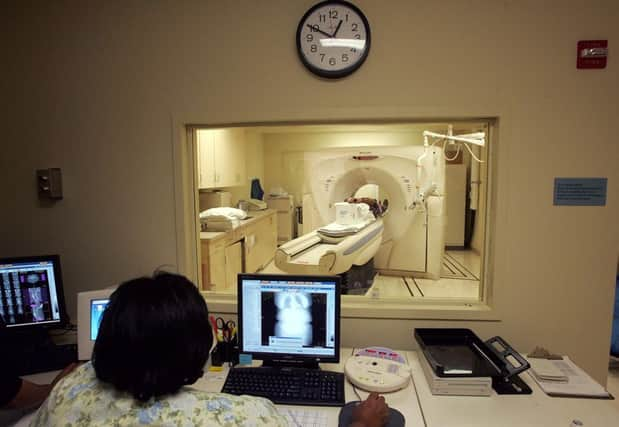Breast cancer drug should be given to healthy women


The research, which involved patients across Scotland and the UK, found the treatment anastrozole halved the likelihood of the disease developing in women at high risk due to their family history.
Anastrozole, which belongs to a class of drugs called aromatase inhibitors, blocks production of the hormone oestrogen. It is used to treat post-menopausal women with hormone-sensitive breast cancer.
Advertisement
Hide AdAdvertisement
Hide AdBut the trial results have now shown that taking the drug for five years can also reduce the chances of high-risk women going on to develop breast cancer by 53 per cent.
Anastrozole was better at staving off breast cancer than tamoxifen, another hormone-suppressing drug already given as a preventative measure, and had fewer side-effects, according to the research in the Lancet.
Experts now want the results to be considered by NHS watchdogs in the hope it used more widely.
Professor Jack Cuzick, from Queen Mary, University of London, said: “This research is an exciting development in breast cancer prevention.
“We now know anastrozole should be the drug of choice when it comes to reducing the risk of breast cancer in post-menopausal women with a family history or other risk factors for the disease.
“This class of drugs is more effective than previous drugs such as tamoxifen and, crucially, it has fewer side-effects.
“Our priority now is ensuring that as many women as possible can benefit from these new findings.”
Prof Cuzick, the trial leader, said including the drug in clinical guidelines would mean more women would benefit from “this important advancement in preventive medicine”.
Advertisement
Hide AdAdvertisement
Hide AdThe “Ibis II” trial, funded by Cancer Research UK, involved almost 4,000 post-menopausal women at high risk of breast cancer. Half were given a one- milligram dose of anastrozole daily for five years and half an inactive placebo.
During the five-year follow-up period, 40 women in the anastrozole group developed breast cancer compared with 85 of those in the placebo group.
Women were defined as “high risk” if they had two or more blood relatives with breast cancer, a mother or sister who developed the disease before the age of 50, a mother or sister who developed tumours in both breasts, or certain types of non-malignant breast disease. In Scotland, the study was co-ordinated at Ninewells Hospital in Dundee, the Western General Hospital in Edinburgh and the Western Infirmary in Glasgow.
Prof Alastair Thompson, a researcher on the trial based at Ninewells, said: “The challenge for us now is how best to implement this new knowledge into clinical practice.”
Breast cancer is the most commonly diagnosed cancer in the UK, affecting 50,000 women each year – including 4,500 in Scotland – and claiming 1,000 lives a month.
Clair Tombe, 67, from Fochabers, Moray, who took part in the study, found she was of a high risk of developing breast cancer as both her mother and sister had been diagnosed. Her cousins were also affected by the disease.
The retired nurse said: “I would like to think that this trial will pave the way to help future generations.”